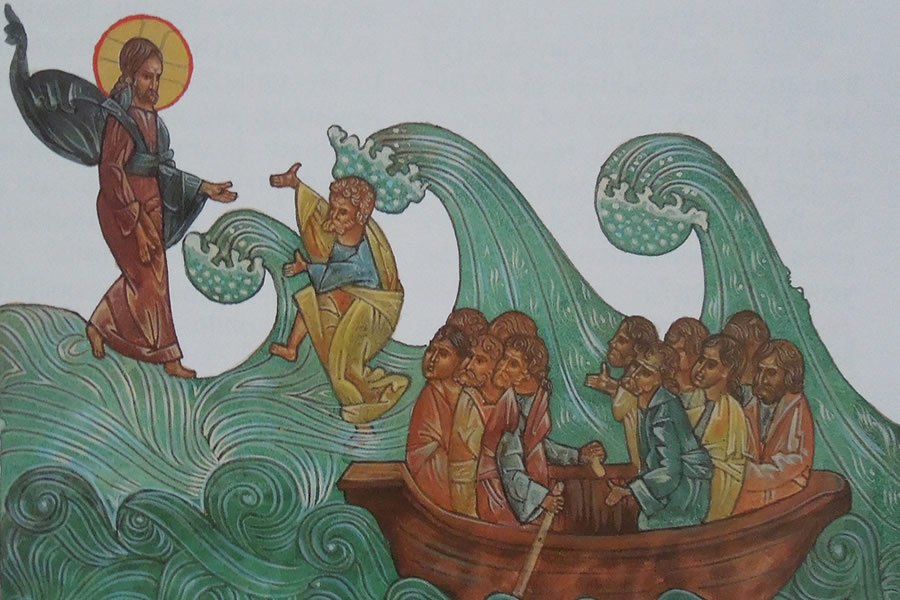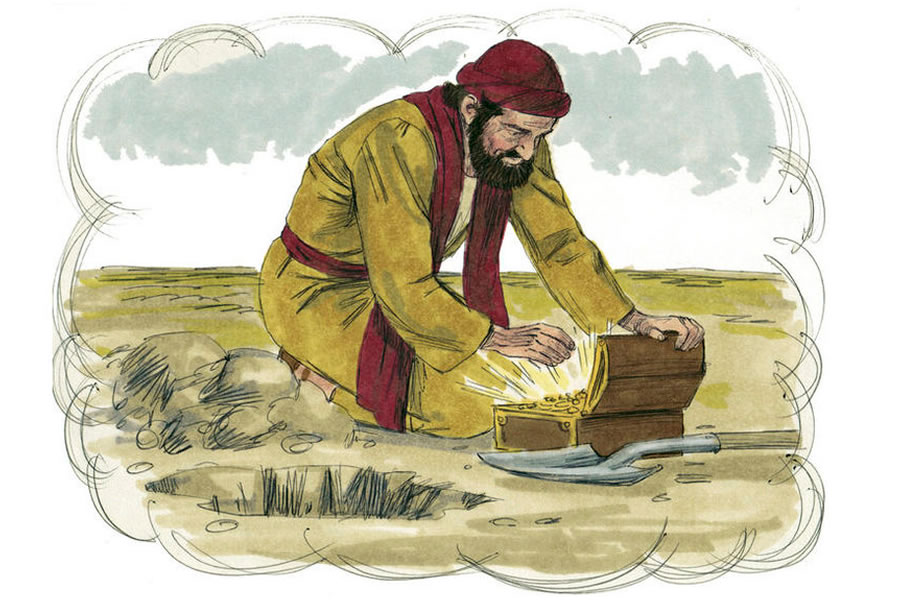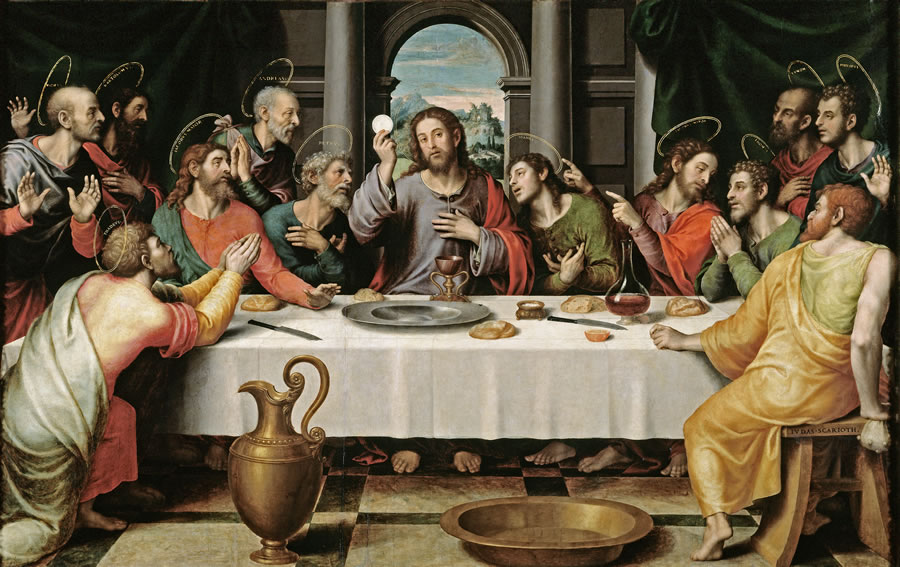St. Francis of Assisi Weekly Reflections

Upon this ROCK I will build my church...
08-27-2017Weekly ReflectionWe Celebrate Worship Resource, Vol. 42, No. 2A key can be very important. Two of today’s readings feature keys as a symbol of authority that grants access. In Isaiah, the prophet is sent to announce that God is taking they keys away from Shebna, the king’s prime minister of the palace, and giving them to Eliakim, to grant the people access and to meet their needs. The image of the keys also appears in our Gospel. Jesus asks what the people are saying about him, and then, what the apostles themselves think about him. Simon’s answer, “You are the Christ, the Son of the living God,” is rewarded (Matthew 16:16). Jesus recognizes that the Father is at work in Simon, and gives him a new name, “Peter,” meaning rock. Jesus then declares, “Upon this rock I will build my church...I will give you the keys to the kingdom of heaven” (16:18, 19). With this, Peter becomes the head of the apostles, but his education in holding the keys will continue. What explains God’s choice? Saint Paul reminds us how inscrutable are God’s judgments and how unsearchable God’s ways. God often chooses to work through weak human beings for the good of others.
Through what unexpected person has God worked for your benefit?
READ MORE
FAITH is what unites the heart of the people with the heart of God
08-20-2017Weekly ReflectionWe Celebrate Worship Resource, Vol. 42, No. 2Inclusion is God’s plan. God’s desire is that all God’s children enter into community with each other and with God. Today’s three readings invite us to reflect on a biblical vision of the relations between Christians and Jews and to extend that to all God’s children. The final section of the book of Isaiah envisions God bringing “foreigners” who have “join[ed] themselves to the Lord” to God’s holy mountain, where their prayer and offerings will be acceptable to God and God’s house shall be called “a house of prayer for all peoples” (56:6,7), Saint Paul emphasized that God called Israel to be a light to the nations, drawing them from disobedience through God’s mercy revealed in Christ; God will not abandon Israel but will once again show mercy. In today’s Gospel, Jesus is truly the face of the Father’s mercy, extending it to a Caananite woman and her sick daughter because of the mother’s faith. Faith is the bond holding all together, allowing everyone a seat at the table. Faith is what unites the heart of all people with the heart of God.
Are you ready for all who will be seated at the table when God’s kingdom comes?
READ MORE
O You of Little Faith, Why Did You Doubt?
08-13-2017Weekly ReflectionWe Celebrate Worship Resource, Vol. 42, No. 2Lord, save me!” Peter shouts (Matthew 14:30). He is sinking not just into the water washing over him; he is drowning in fear. What happened? Listen carefully. At first, the apostles think it is a ghost coming toward them across the water in he dark night. They cry out in fear. But Jesus calms them, “Take courage, it is I; do not be afraid” (14:27). Fear is one of the greatest threats in the Bible. Many times people are told not to be afraid. Fear indicates a loss of faith. Peter, however, responds to Jesus’ call to courage: “Lord, if it is you, command me to come to you on the water?” (14:28). Jesus simply says, “Come,” so “Peter got out of the boat and began to walk on the water toward Jesus” (14:29). Read that line again. But then, “when he saw how strong the wind was he became frightened” and he began to sink (14:30). Fear replaces faith. Peter watches the waves, not Jesus—but not totally: “Lord, save me!” Then, “Immediately Jesus stretched out his hand and caught Peter, and said to him, ‘O you of little faith, why did you doubt?’” (14:31).
Is this the question Jesus asks you? When has your fear overcome your faith?
READ MORE
This is My beloved Son...Listen to Him.
08-06-2017Weekly ReflectionWe Celebrate Worship Resource, Vol. 42, No. 2This is My beloved Son...Listen to Him.
Today we remember that glimpse of glory given to Peter, James, and John when Jesus had taken them up a mountain to pray with him. Imagine what it must have been like for these three fishermen to see Jesus, whom they had come to know as their leader and friend, as a preacher, teacher, wonderworker, exorcist, healer, and forgiver of sins, suddenly transformed, radiant, brilliant, engaged in conversation with two of the greatest figures in their history, Moses and Elijah. For a few moments they saw Jesus in full glory, then heard a voice from heaven call him "my Son," telling them—and us—"listen to him" (Matthew 17:5). We also hear the prophet Daniel's vision of God in heaven, the Ancient One, receiving someone called the Son of Man and "giving him dominion, glory and kingship" over all peoples and nations (Daniel 7:14). This vision in Daniel captures Jesus' final destiny, but first there was the cross. The Eucharist reminds us that we are destined for glory with Christ. But first we continue to live out the dying to selfishness and sin, thereby offering others glimpses into the glory yet to come.
How are you being called to "listen to him"?
READ MORE
What treasures in your life are worth giving up all you have?
07-30-2017Weekly ReflectionWe Celebrate Worship Resource, Vol. 42, No. 2What would move you to sell all you have to possess something of great value? Two parables today present such behavior. In the first, the finder accidentally stumbles over a treasure hidden in a field, but once he discovers it, he goes and sells everything to buy the field. And he does this with joy. In the second parable, a merchant is deliberately searching for fine pearls and when he comes upon one, he also sells everything to purchase it. What is Jesus saying here? Whether you stumble upon the kingdom of heaven or deliberately seek it out, once you find it, it is worth giving all you have. The kingdom of heaven is Matthew's way of talking about God's presence in life, the gift of God that is God. In the first reading, young King Solomon responds to God's offer—Ask for anything and I will give it—by requesting wisdom, that is, an understanding heart to judge justly and wisely. Wonderful! Paul names another great gift as the call to love God, a gift given to us at Baptism.
What treasure do you seek? What gift do you ask God fortoday?
READ MORE
God is Always on Our side
07-23-2017Weekly ReflectionWe Celebrate Worship Resource, Vol. 42, No. 2A “no weeds” approach to life is tempting. When we find an idea, a value, an action, or even a person or group of people that threatens what we think or do, appreciate, or honor, the tendency is to oppose it. Cut down this weed and burn it. Jesus counters this impulse in today’s parable of the weeds and the wheat. Premature action could lead to destruction of life. So, the wise householder decides to let weeds and wheat grow together until harvest, so the wheat can be saved. This parable mirrors the reading from Wisdom, which speaks of God as one who judges with clemency and governs with leniency, giving people “good ground” in which to grow. Such divine generosity is also exhibited in the parable of the tiny mustard seed that grows into a bush housing all the birds who dwell in its branches, and in the parable of the yeast that signals the penetrating power of God’s mercy. St. Paul writes about the Spirit interceding for us even in our weakness. Overall, today’s scriptures place God firmly on our side, even when destructive powers (“weeds”) threatens to overwhelm us.
READ MORE
God's word makes the Earth fertile and fruitful
07-16-2017Weekly ReflectionWe Celebrate Worship Resource, Vol. 42, No. 2For Isaiah, God’s word is like the rain and snow that come down from heaven, making the earth fertile and fruitful. God’s word is both effective and efficacious. For the next three weeks, we hear Jesus the storyteller, sowing parables as seeds that will bear fruit by revealing the mysteries of the kingdom of heaven. A seed is a wonderful symbol of God’s power working through something small, which often seems to be God’s way of doing things. This third great discourse of Jesus in Matthew’s Gospel gathers together stories Jesus told during his ministry. These parables enable the proclamation of God’s ongoing presence and working in our world and our lives. The seed of God’s word continues to fall into the soil of our communities and our individual lives or ends up being choked off by our cares or our indifference. But at other times, God’s word does send down roots and bears fruit beyond all expectation. Through this word, God enters into conversation with us. Which of Jesus’ teachings do you see bearing fruit in yourself? Which needs some effort on your part?
READ MORE
For my Yoke is Easy, and my Burden is Light
07-09-2017Weekly ReflectionWe Celebrate Worship Resource, Vol. 42, No. 2In today’s Gospel, notice how Jesus praises God, first as Father, then as Lord of heaven and earth, bringing together intimacy and transcendence. His primary relationship with the One Israel called Lord is captured by the word “Father.” This relationship of Father-Son defined Jesus in a way that takes us into the heart of the mystery of the Trinity. But then Jesus opens his relationship to us: “No one knows the Son except the Father, and no one know the father except the Son and anyone to whom the Son wishes to reveal him” (Matthew 11:27). More wonderful still is Jesus’ revelation to us that Father has revealed “these things” to the little ones rather than the wise and learned. What “things” are these? The truth that the Son is meek and humble of heart, the one foretold by Zechariah as coming not as a warrior but as a peacemaker, bringing peace to the nations, a cause for rejoicing. In a world so often torn by war and violence, Jesus wishes us to put on his yoke, to be guided living in the Spirit of God (Romans 8).
Do you ask the Son to reveal the Father to you...daily?
READ MORE
Have you taken up your Cross?
07-02-2017Weekly ReflectionWe Celebrate Worship Resource, Vol. 42, No. 2“one-liners” and consider each one separately. Jesus is to be the first love of the missionary. The missionary has to be willing to take up the cross as Jesus did, to give his life for Christ’s sake. On the other hand, those who receive these missionaries receive Christ, and they will be rewarded. We see this happening in the first reading, when the hospitality of the childless woman of Shunem is eventually rewarded by the prophet, who tells her that she will have a son within a year. The reading from Romans shows us the generosity of God when we give ourselves over to dying with Christ in living out our Baptism: If we die with him, we shall live with him.
How are you “living for God in Christ Jesus” by participating in the work of a missionary who proclaims Jesus Christ by your life?
READ MORE
What I say to you in the Darkness, speak in the Light
06-25-2017Weekly ReflectionWe Celebrate Worship Resource, Vol. 42, No. 2“Fear no one,” Jesus says to the Twelve, as he sends them out “to the lost sheep of the house of Israel” (Matthew 10:26, 6). This Gospel comes from the middle of his second great speech in Matthew’s Gospel (Matthew 9:36—10:42), called the missionary discourse. Jesus is instructing the Twelve on what to do on their mission. Since we are all called to be evangelizers (“proclaimers”) and witnesses to the gospel, these words have meaning for us. “Do not be afraid” is often heard in the Gospels. Even though they are sent to their own people here, there is no reason to be afraid, as the prophet Jeremiah also realized in his day, as his friends turned against him for preaching God’s word to them. Jesus saw that his followers would suffer, just as he was going to do. So he encourages his followers not to let fear control them. The God who watches over sparrows, who knows the number of hairs on our heads, will watch over us. God sent Jesus to save us, and Jesus promises that if we acknowledge him before others, he will acknowledge us before the Father.
When have you let fear silence you as a believer?
READ MORE
I am the LIVING bread that came down from HEAVEN
06-18-2017Weekly ReflectionWe Celebrate Worship Resource, Vol. 42, No. 2This Sunday we celebrate our intimate communication with Christ and with all the members of the Body of Christ in the Eucharist. Just as Baptism brings us into sharing the life of the Trinity, celebrated last Sunday, so the Eucharist brings us into a most intimate sharing in the mystery of Christ’s saving death and resurrection. In the Gospel of John, Jesus declares that he himself is the bread come down from heaven, and that the one who eats his flesh and drinks his blood has eternal life even now and will live forever (cf. John 6:51, 54). Paul underlines the Eucharist as a meal that allows us to participate in the body and blood of the Lord and that signals our unity with each other, holding up the one loaf of bread as a sign of many becoming one. This sacrament empowers us to give ourselves in service to the world. We are fed by both the word of God, as Moses reminds the people about to enter the Promised Land, and by the sacrament of the Eucharist.
How has the Eucharist been a source of nourishment for you, both as an individual and as a member of the body of Christ?
READ MORE
We return to “Ordinary Time” today (which means “numbered time” - tenth week, eleventh week, etc.) by celebrating the central mystery of our faith: the Trinity, God as one God yet three distinct persons. Makes your head hurt? Our readings help take us into the mystery of our God whom we name as the Father and the Son and the Holy Spirit (the “ands” are important, reminding us of three distinct persons). God helps Moses to understand what it means to call God “Lord,” identifying himself to be merciful, gracious, slow to anger, rich in kindness and fidelity. Mercy is the word that best captures the God of the Old Testament. God showed the divine face in the person of God’s Son Jesus Christ, so that is where we look to “see” God. The Son came to reveal the Father to us. And both the Father and the Son sent the Holy Spirit to draw us into the life and love of the Trinity. This all began at our Baptism and continues wherever we worship God by celebrating the Eucharist. Still not clear? Well, keep praying, “Glory to the Father, and to the Son, and to the Holy Spirit...”
How is God leading you to knowing and living this mystery?
READ MORE
Pentecost: Newness, Harmony and Mission
06-04-2017Weekly ReflectionWe Celebrate Worship Resource, Vol. 42, No. 2Pope Francis has said that Pentecost brought three things to the community waiting for it: newness, harmony, and mission. Of course, something new first happened with the coming of Christ: God became human. Then, something new happened on Easter: Jesus who had been crucified and buried, did not remain dead. God raised him. Then again, for the third time, something happened. The Holy Spirit came, bringing a breath of fresh air that blew them out of the house, transforming them harmoniously into the body of Christ, and inflaming them to preach Jesus as Lord, the Son of God. The important role of the Spirit is summed up in Paul's words, "No none can say, 'Jesus is Lord,' except by the Holy Spirit...For in one Spirit we were all baptized into one body...and we were all given to drink of one Spirit" (1 Corinthians 12:3b, 13). This Spirit brings us peace and joy, along with the mission of bringing God's forgiveness to all who would receive it. Pray today's Sequence.
Which of the Spirit's many gifts do you need most at this time: light, comfort, refreshment, rest, coolness, healing , strength, warmth, guidance, joy?
READ MORE